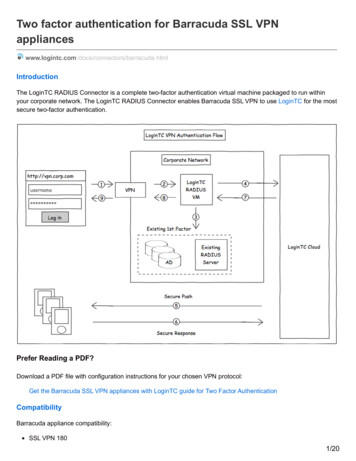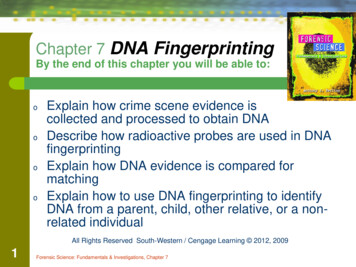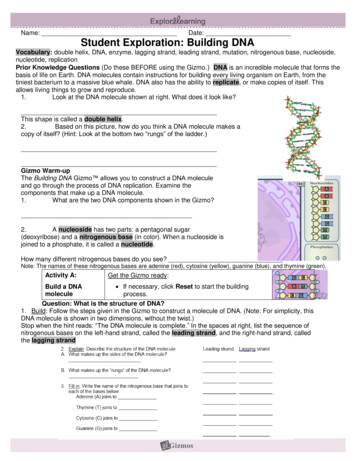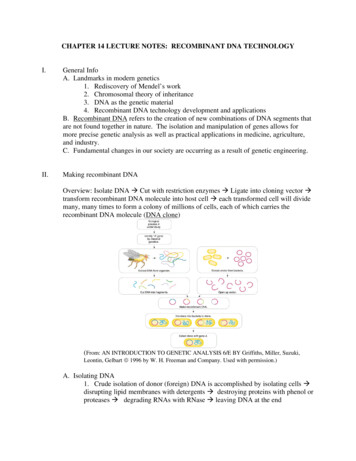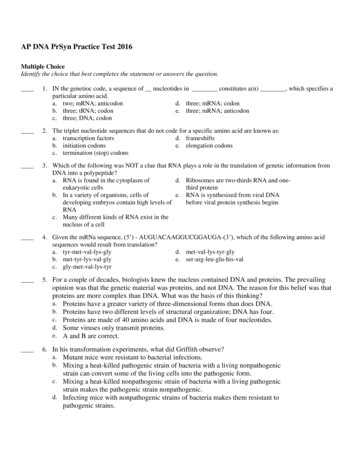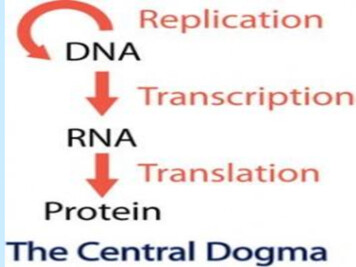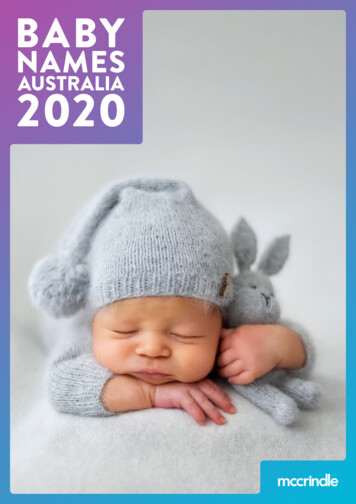
Transcription
BABYNAMESAUSTRALIA2020
The Baby Names Australia Report 2020 is produced by:McCrindle Research Pty LtdSuite 105, 29 Solent CircuitNorwest NSW 2153AUSTRALIAmccrindle.com.auinfo@mccrindle.com.au 61 2 8824 3422Authors: Ashley FellContributing author: Mark McCrindleData visualisation and design: Ben DuffinTitle: The Baby Names Australia Report 2020ISBN: 978-0-6486695-3-1 McCrindle Research Pty Ltd 2020This report is copyright. Fair dealing for the purpose of private study,research, criticism or review is permitted under the Copyright Act. In additionthe Publisher grants permission to use images and content from this reportfor commercial and non-commercial purposes provided proper attribution isgiven such as ‘The Baby Names Australia Report 2020’ by Ashley Fell is usedby permission McCrindle Research.
ContentsExecutive Summary 04Introducing Generation Alpha 05Baby Names 2020 07Charlotte and Oliver the most popular names for Gen Alpha 07Seven boys’ and six girls’ names enter the Top 100 08A botanical flare 08Gendered names 09The trending Gen Alpha baby names 10More creativity, less convergence 11The 100-year return 12Celebrity influences 12The influence of Biblical names 13Colours and places 13It’s all in the ending (and the beginning) 14Boy’s names feature less syllables 14Shorter names win out 1460 years of change 15The royal influence 16Compared across Australia 17How does Australia compare to the rest of the world? 18Top 100 boys’ names 19Top 100 girls’ names 20
Executive SummaryEach year Australia’s states and territories publish the topnames given to babies in the previous year. At McCrindle, wecollate this data from the respective states and territories,analyse it, and uncover the nation-wide trends.Analysing baby names at any point in history paints afascinating picture of that era. The Builders generation (bornbefore 1945) chose traditional names such as Peter, Paul,John, Karen, Jennifer or Sharon for their children. In the 1980sthe Baby Boomers began drawing on baby name booksfor inspiration and trends. Meanwhile today’s parents, theMillennials, are not only choosing new and different names,they are parenting a new and unique generation – GenerationAlpha.New names for a new generation: Generation AlphaThe year 2010 marked the beginning of not only a newdecade, but a new generation. Children born in the last tenyears are known as Generation Alpha – the most digital,global and visual generation on the planet. They are thechildren of the Millennials and will finish being born at theend of 2024. We gave this cohort the name Generation Alpha(of the Greek alphabet) because, being born entirely in the21st Century, they are not a return to the old but the start ofsomething new.Parents opting for uniquenessParents of Gen Alpha (the Millennials) have more access toinformation than at any other time in history. Parents areinundated with options, research and meaning, all impactingthe names they choose for their children.Prior to the baby name books of the 80s, baby names wereinfluenced by family and religious traditions. In recent yearsthe internet has facilitated an explosion of blogs, websitesand even baby naming apps. Baby name websites include notonly baby name lists, but baby name search engines. It hasnever been easier to search the history of a prospective nameand suitable sibling name options.04Baby Names Australia 2020Trends impacting the naming choices of MillennialparentsThe average first-time parents of today were born in orapproaching the early 1990s. These parents are likely to havegrown up with several classmates named Matthew, Chris,Sarah and Jessica. In today’s digitally connected world, yourname is more than what your teacher calls you. Your name isnow your social media handle, your personal brand and yourweb domain.For parents of Generation Alpha, there is a trend to nameone’s child something that won’t end up as generic asSarahSmith205 on social media. But it is also a name thatneeds to carry this generation through a lifetime of multiplecareers. There are many trends and considerations for today’sparents when it comes to choosing a name for their GenAlpha baby, with names for this generation considered digitalreal estate in an increasingly global era.
Introducing Generation AlphaThere is a generation that comprises more than one in sevenresidents, are influencing the purchasing power of theirhousehold and are key to the future, yet few people haveheard of them. Within the next four years they will outnumberthe Baby Boomers, and most of them will live to see the 22ndCentury.We’re talking about Generation Alpha, the current generationof children who began being born in the year 2010. They arethe children of the Millennials, and often the younger siblingsof Generation Z. There are 3 million of them in Australia andmore than 2.8 million are born globally every week. Whenthey have all been born (2025) they will number almost 2billion – the largest generation in the history of the world.While they are currently the youngest generation, they havebrand influence and purchasing power beyond their years.They shape the social media landscape, are the popularculture influencers and are the emerging consumers.It is important to understand the traits of Generation Alphabecause they represent the future and provide a lensthrough which to look at the next decade and beyond. WhileGeneration Alpha are currently our primary school students,by the end of the 2020s they will be moving into adulthood,the workforce and household formation, ready or not. Iforganisations want to not only exist in a decade’s time, butthrive and flourish, then understanding Generation Alphaand the future they will be shaped in and contribute to, isimperative.To find out more visitgenerationalpha.com05Baby Names Australia 2020Why we named them Gen AlphaJust over a decade ago, during research for Mark McCrindle’sbook The ABC of XYZ: Understanding the Global Generations,it became apparent that a new generation was aboutto commence and there was no name for them. Beinga research agency with a keen interest in generationalanalysis, we decided to test a few names out with a survey ofAustralians. When we asked people what they thought thenext generation should be called, a lot of people suggestedGeneration A, having come to the end of the alphabet withGeneration Z. But Generation Alpha represent a whole newgeneration, entirely born in a new century. Going back to thebeginning didn’t feel right for this next generation.Additionally, this was all taking place just after the Atlantichurricane season of 2005, when there were so many stormsthat the normal alphabetic names had been used up and sofor the first time, the Greek alphabet was used, starting withhurricane alpha and hurricane beta etc.So in keeping with this scientific nomenclature of using theGreek alphabet in lieu of the Latin, and having worked ourway through Generations X, Y and Z, we settled on the nextcohort being Generation Alpha – not a return to the old, butthe start of something new.We have also found from our generational research thatgeneric labels rather than descriptive ones are likely to last.Names like the Baby Boomers, which describe a uniquedemographic phenomenon at the birth of a generation,based on the timing when the leading edge were coming ofage, are aberrations.A label like Generation X, Generation Z or Generation Alphaprovides a blank canvas on which a generation can createtheir own identity rather than have a descriptive label,relevant for just a segment of the cohort or for a period oftime pinned on them. It’s a whole new generation and a wholenew millennium, in a whole new era. Hence Generation Alpha.
Shaped by technologyGeneration Alpha is defined by technological devices likesmartphones and tablets, video games, driverless trains,autonomous cars and smart speakers that speak back toyou. This technology has only been developed within theirgeneration and it is all they have ever known. It is also beingtaken up quicker than ever before. While radio took 38 yearsto reach 50 million users, the television took 13, the iPod justfour, the internet three, Facebook just one and Pokémon Gophenomenon took just 19 days!Coming of age in unprecedented times of change and rapidtechnological advancement, Generation Alpha is part of anunintentional global experiment where screens are placed infront of them from the youngest age as pacifiers, entertainersand educational aids. This great screen age which we areall living in has bigger impacts on the generation exposedto such screen saturation during their formative years. Fromshorter attention spans to the gamification of education, fromincreased digital literacy to impaired social formation, thesetimes impact us all but transform those in their formativeyears.Generation Alpha will be raised as “screenagers” to a greaterextent than the fixed screens of the past could facilitate.For this reason, we also call them Generation Glass. It isalmost impossible to pry Generation Alpha away from theirdevices, which have been prominent in their lives from theday they were born. Their exposure to technology during theirformative years will have a great impact on their lives. Theyhave been using these devices from before they could talk, sowe are yet to see the impacts of their interaction with screens.There will certainly be some positives, but like any othergeneration, it will provide Generation Alpha with some uniquechallenges.A positive outlookThe outlook for Generation Alpha is positive, even amidst somuch change. We are talking about a generation that will livelonger, work later, will be more formally educated, materiallyendowed and globally, will be the wealthiest generation todate. The youngest Generation Alpha’s won’t need a car orlicense when they hit adulthood, with public transport, Uberand driverless cars making these parts of modern life todayobsolete.While Generation Alpha will encounter a lot of change, it isimportant to remember that some timeless human needs donot change. Amidst all the change, Generation Alpha will stillcrave acceptance, community and belonging. These timelesshuman needs, while expressed differently over time, will bethe key drivers for Generation Alpha and are important forleaders, organisations, parents and community groups tokeep in mind as they lead Generation Alpha through the nextdecade and into adulthood.
Baby Names 2020Charlotte and Oliver the most popular names for Gen AlphaCharlotteOliverCharlotte, the name given to 1,609 Australian baby girlsin 2019, has been a consistently popular baby name forGeneration Alpha. Out of the last 10 years, Charlotte hasbeen crowned the number one baby name for seven ofthose years, and has been the #1 girls’ name each year sinceovertaking Olivia in 2015 (which uncoincidentally was the yearthat Princess Charlotte was born).While Charlotte maintains her reign, the gap between the twomost popular girls’ names is closing. In 2018 there were 219more Charlottes than Olivias, however in 2019 there was only34 more Charlottes than Olivias. While in a slightly differentorder, the Top 10 girls’ names have not changed in the pastyear.Top 10 girls’ namesRankName1Charlotte2Oliver, the name given to 2,206 Australian baby boys in 2019,has also been consistently popular over the last decade,having enjoyed an uninterrupted seven years at the top spotsince overtaking Jack as the #1 boys’ name in 2013.In 2019, Noah overtook William and Jack to become thesecond most popular boys’ name, while Charlie has enteredthe Top 10 at the expense of the name Liam, which droppedto 11th place.Top 10 boys’ 0959Charlie1,19710Chloe1,03810James1,17607Baby Names Australia 2020Occurrences
Seven boys’ and six girls’ names enter the Top 100The names Ezra, Felix, Marcus, Fletcher, Ari, Aaron and Billyhave entered the list for the boys at the expense of Toby,Nathan, Maxwell, Nicholas, Blake, Phoenix and Leonardo. EnteredCurrentRank ExitedPreviousRankAs for the girls; Sadie, Madeline, Riley, Peyton, Lilly and Rosiehave entered the Top 100 with; Adeline, Eliza, Alyssa, Harlow,Hayley and Madeleine dropping out of the list. EnteredCurrentRank leine97Leonardo96Billy100A botanical flareParents continue to use the botanical themeas a source of naming. This can be seen innames like Willow (8th), Ivy (15th), Lily (22nd),Violet (39th), Poppy (43rd), Daisy (56th),Jasmine (60th), Olive (70th) and Rose (76th).Two of the six names that entered the Top100 girls’ list have a botanic theme – Lilly(96th) and Rosie (98th).Of the top five girls’ names that mostsignificantly increased in popularity in the2010s, three had a botanical theme. From2010 to 2019, Willow increased 66 positions,now sitting at 8th position. Violet increased53 positions (now at 39th position) and Ivyincreased 52 positions (now at 15th position).08Baby Names Australia 2020In contrast, no Top 100 boys’ names havebotanic influences.
Gendered namesOnly two names in the Top 100 appear on both the girls’ andboys’ list in exactly the same spelling – Charlie (75th for girlsand 9th for boys) and Riley (debuting on the girls’ list in 2019at 81st and sitting at 43rd on the boys’ list).There are a number of names with female and maleiterations:RankGirlsBoysRankWhile most names on the Top 100 are more distinctly boys’or girls’ names, several girls’ names from the Top 100 canbe interchanged for boys’ names. Some examples of thesenames include Harper (9th), Frankie (36th), Mackenzie (52nd)and Peyton In similar fashion, parents are increasingly using popular boys’names when naming their daughters – names such as Dylan,Jordan, Luca, Ashton, Kai, Bailey and 9Baby Names Australia 2020Charlie11009Eli46Harry23RileyRiley43TheaTheo79
The trending Gen Alpha baby namesIn the last two years, the names making the biggest jumpup the list are Arthur, climbing 23 places to 49th, and Millie,jumping 30 places to 69th.In the last three years the crown for the hottest trendingname goes to Luna. Luna entered the Top 100 for the firsttime in 2017, debuting at 83rd. Luna’s popularity continues togrow, jumping 21 spots in 2018 to 62nd position and a further30 spots to be ranked 49th most popular girls’ name in 2019.Biggest rise 2018-2019Biggest fall ecreaseNameRankdecreaseArthur 23Millie 30Nate 29Indiana 25Theo 20Madeline 17Luke 22Madison 23Beau 15Heidi 15Tyler 17Thea 23Bodhi 14Luna 13Darcy 16Rose 20Harvey 13Bonnie 11Dylan 12Savannah 19As we conclude the decade of the 2010s, we can see thenames that have so far stood the test of time for GenerationAlpha babies.Sofia rose 43 positions since 2010, now in 44th position. Thiscould be attributed to Sofia Vergara, a famous AmericanColombian actress whose popularity spiked when ModernFamily first aired in September 2009.Since 2010, Leo jumped an incredible 86 positions to sit in 5thposition.George jumped 45 positions over the last decade, now in 33rdposition. This could be attributed to Prince George’s birth in2013, who is third in line to the British throne.Biggest rise 2010-2019Biggest fall ecreaseRankincreaseRankdecreaseLeo 86Willow 66Jake 61Chelsea 73Hugo 53Violet 60Luke 58Madison 62Hunter 45Ivy 52Tyler 58Lilly 57George 45Audrey 48Matthew 48Maddison 52Elijah 45Sofia 43Dylan 45Lara 4410Baby Names Australia 2020
More creativity, less convergenceThe Top 10 names account for 25% of all the babies givena Top 100 name. This is lower than previous decades whenthere was greater convergence around fewer names. Parentstoday are less likely to name their child one of the top namesas they select from a greater range of names.Even though there are more births today than twenty yearsago, the number of occurrences on the Top Baby Names list isless. As this NSW Births Registry data shows, today just one in12 babies are given a Top 10 name (8.6%) compared to one insix (15.7%) twenty years ago.YearTop 10occurrences(AUS)Top 10 namesas % all births(AUS)Top 100 namesas % all YearTop 10occurrences(NSW)Total births(NSW)Top 10 namesas % all %Our compilation of the national Top 100 baby names datashows the same trend of decreasing occurrences of Top 100names even amidst strong birth numbers. Over the last sevenyears, the proportion of all newborns given a Top 10 namehas dropped from more than 10% to just over 9%. Similarly,the Top 100 names account for 38.2% of all births, down from40.6% in 2012.This naming originality is even more evident amongst thenaming of girls than boys. The Top boys’ name Oliver (2,206occurrences) has 37% more occurrences than the top girls’name, Charlotte (1,609).11Baby Names Australia 2020
The 100-year returnWhile there is a trend to opt for more unique names,traditional names are also popular among Generation Alphababies and demonstrate the 100-year return trend. Gracewas a moderately popular girls’ name at the turn of the 20thcentury, coming to a near decline from the 1910s to 1970s butclimbing significantly in popularity since the 1980s. Over thelast five years it has been consistently rising in popularity andfor two years now has been in the Top 10.Charlotte is another example of a near extinct name that hashad a significant resurgence. In 1989 it debuted back in theTop 100 for the first time in the modern era, at 86th, and by2013 it achieved first position on the list, which it has retainedfor four of the last five years.Jack, which has had more years at number one this centurythan any other boys’ name, was not even in the Top 100 in1985. It is an example of the 100-year return, having been thefifth most popular name in the 1920s, before its decline untilrecent years.William has been the second most popular boys’ namenationally for the last five years, a position that amazingly, itheld for a similar period of time, exactly 100 years ago. It is aname that, while it declined in popularity through the 1940s,50s and 60s, it never totally dropped off the list and the royalinfluence is such that its currently popularity will remainstrong for some time.Celebrity influencesPop-culture influences play a role in the baby naming trendsof Australian parents. From exposure to television, movies andsocial media, millennial parents are drawing inspiration fromcelebrities when it comes to naming their children.CelebrityRankChangeBillie Eilish (singer)660Ariana Grande (singer)85 1Millie Bobby-Brown (actor)69 304 268, 93 5, 690 2233, 66 1, debutNoah Centineo (actor)Muhammad Ali (boxer, dec.)Luke Perry (actor, dec.)George Ezra (singer)12Baby Names Australia 2020
The influence of Biblical namesFirst names were traditionally called Christian names and forgood reason – many given names had a Christian or Biblicalreference. First names are now referred to as given names,because parents are influenced by many factors these dayswhen it comes to baby names. Even though Christianity isstill the dominant Australian religion, its cultural influence haswaned.Two decades ago, all five of the top five boys’ names were Biblecharacters (Joshua, Daniel, Matthew, James and Thomas),and twelve of the Top 20 were from the Bible (which includedBenjamin, Luke, Nathan, Andrew, Alexander, Jacob andSamuel). Today, just six of the Top 20 boys’ names can be foundin the Bible: (Noah (2nd), Thomas (7th), James (10th), Alexander(12th), Elijah (13th) and Ethan (14th). Over this same period oftime, the proportion of the Top 20 girls’ names that come fromthe Bible has similarly declined from three (Sarah, Rebecca andHannah) 20 years ago to just one today (Chloe, 10th).Colours and placesWhen it comes to baby girl names, parents are also drawing inspiration from colours, more so than places.ColoursColoursPlacesRankChangeRuby14 2Scarlett28HazelRankChangeGeorgia24 4 1Florence46 133 5Victoria91 1Violet39-Madison93 23Jasmine60 3Chelsea97 5Olive70 9Indiana99 25Rose76 2013Baby Names Australia 2020Places
It’s all in the ending(and the beginning)The rise of gentle, softer-sounding names for girls and firmersounding names for boys is an ongoing trend with babynames in Australia.In the Top 20 list, 85% of the girl’s names (17) end with a vowelor ‘y’ sound, with almost half (8) of these ending with the letter‘a’, producing the gentle ‘ah’ finish. The only names in the Top20 girls’ names that end with a consonant are Willow, Harperand Evelyn.On the boys’ list, however, 80% of the Top 20 names endwith a consonant sound! In the Top 20, just four names – Leo,Henry, Charlie and Theodore – end with a vowel or ‘y’.Popular girls’ names are not only most likely to end in a vowelbut they are most likely to begin with one too. Of the Top 50girl’s names, 22 begin in a vowel compared to just 12 of theTop 50 boy’s names.Boys’ names featureless syllablesParents are choosing longer, more flowing names for theirdaughters and shorter, more solid-sounding names for theirsons.A total of nine girls’ names have four syllables (Olivia, Amelia,Isabella, Penelope, Emilia, Elizabeth, Ariana, Victoria andIndiana) in them, while only Alexander has four syllables in theboys’ Top 100 list.Girls are twice as likely to have three syllables in their name,and boys are more than three times as likely as girls to have asingle-syllable name: Four names feature in the girls’ list with a single syllable:Grace (7th), Claire (74th), Rose (76th), and Quinn (90th). 13 names feature in the boys’ list with a single syllable:Jack (3rd), James (10th), Max (22nd), George (33rd),Finn (42nd), Kai (53rd), Flynn (59th), Beau (63rd),Charles (78th), Jude (84th), Jake (87th), Luke (90th) andNate (96th).14Baby Names Australia 2020Shorter names win outJack (3rd) beats out Jackson (45th). Archie (25th) beatsArcher (27th) and Max (23rd) is more popular than Maxwell(which has fallen out of the Top 100 this year). Even for girls,currently Ella (11th) outranks Isabella (17th) and Isabelle (40th).In true Aussie fashion, we are also seeing a trend ofshortening names and adding an ‘ie’ on the end: Rose toRosie, Savannah to Sadie, Amelia to Millie, Isabella to Billie,Charlotte to Charlie, Elizabeth to Ellie and William to Billy.
60 years of changeBaby name analysis tells a fascinating story about times in history.Below is analysis of the top baby names over twenty-year increments.1950sBoomers1970sGen X1990sGen Y/Z2010sGen Alpha1950sBoomers1970sGen X1990sGen Y/Z2010sGen ceRankThroughout the 1960s, Sharon was a Top 10 name, evenbecoming the second most popular name for two years in themid-1960s. However, by the late 1970s the name had droppedtowards the end of the list and has not appeared in the Top100 since 1983. Kylie followed a similar path, and even got tofirst position on the girls’ list in 1973, but has not been in theTop 100 since 1990.Throughout the 1960s, Wayne was a Top 20 name, but the1970s saw it decline and by 1987 it was out of the Top 100 andis currently in the extinct zone. Darren rose to prominenceover a similar period and reached 10th on the list in 1966 andwhile the name lasted in the Top 100 a little longer, by 1990he also had disappeared. Brett was also a Top 20 throughmost of the 1960s, declined in popularity through the 1970sand 80s and last appeared in the Top 100 in 1992.15Baby Names Australia 2020Jessica was Australia’s most popular girls’ name for 16 yearsfrom the mid 1980s to the early 2000s. In the mid 1990s,approximately one in every 30 girls born in Australia wasnamed Jessica. Less than 20 years after it was at number one,Jessica did not even make it into the Top 100 in 2019.From the mid 1990s until 2003, Joshua was the most popularboys’ name in Australia. Not since the dominance of David inthe 1960s or Michael in the 1970s has a boy name had sucha popular run. However, since then, the popularity of Joshuahas been consistently falling. In 2019, Joshua was ranked 39th.
The royal influenceThe British Royal Family continue to capture the heartsof Australians. From the moment Kate Middleton steppedout of the carriage on her wedding day onto the steps ofWestminster Abbey, the ‘Kate effect’ was born.Beyond Kate, the extended royal family are not justinfluencing the fashion and hairstyle choices of modernAustralians, but also their choice of baby names.Prince George (born 2013) and Princess Charlotte (born 2015)have significantly contributed to the popularity of thesenames.In the five years since Prince George was born, George’s rankin the baby name list jumped 37 places. George now sits at33rd position.When Princess Charlotte was born in 2015, her name overtookOlivia as the most popular baby name, it has remainedundefeated to this day.Unsurprisingly, since the birth of Prince Louis in 2018, hisname has gained a boost in popularity. Louis has jumped 25places since 2017, now at 48th position.Similarly, the name Archie has been rising in popularity, andhas climbed the ranks by four positions since the Birth ofArchie Harrison Mountbatten-Windsor in May 2019.16Baby Names Australia 2020RoyalRankChange since 2018Charlotte1-William4 1Harry23 7Archie25 4George33 1Louis48 11Elizabeth55 2Charles78 4
Compared across AustraliaOliver topped the boys’ list across Australia again in 2019.The only exception is in Western Australia, where Jack tookfirst place. The top five boy names were more varied acrossthe states and territories in 2019. George and Charlie onlyappeared in the top five in Tasmania. Lucas only appeared inthe Western Australian top five, while Michael and Liam onlyappeared in the top five in the Northern Territory.The top five girl names were not as varied as the boys’ namesin 2019, but a big difference is that Charlotte only topped thelist on two of the eight states and territories, compared to fivethe year before. Willow topped the Tasmania list and featuredin the top five in Queensland, while the only other variation isthe name Evie which also features in the Tasmanian top five.Top boys’ names by liam5LeoThomasHenryNoahLeoHenryLiamJackTop girls’ names by vieIslaOlivia17Baby Names Australia 2020
How does Australia compare to the rest of the world?Top names RubyCharlotteEmilyAriaWhen comparing the top five Australian baby names withother English-speaking countries, there are many similarities.This highlights the global nature of baby name trends, fittingfor a global generation – Generation Alpha.For the boys, James only features in the USA top five whilethe royal influence of George and Harry are unique to theUK top five, and Jackson and Benjamin are unique to theCanadian top five list.While there are similarities, the only names that feature onall lists are Olivia and Noah. Mia is unique to the Australiantop five, while Ruby is unique to the New Zealand top five,Isabella to the USA top five, Emily to the UK top five andEmma and Aria to the Canadian top five.The Australian top five list is most like the New Zealand list.Four out of the top five girls’ and boys’ names feature on boththe Australian and New Zealand lists.18Baby Names Australia 2019
Top 100 boys’ namesChange in rankfrom previous year26 Isaac 183151 Jaxon 454976 Owen 6315 2 1,82527 Archer 278952 Carter054077 Adam 2309Jack 11,71728 Lachlan 577953 Kai053978 Charles 43074William 1 1,68829 Cooper 376354 Jasper 253779 Theo 202865Leo 230 Samuel 276255 Patrick 950580 Tyler 172746Lucas 2 1,34831 Luca 1276256 Jayden 450281 Dylan 122687Thomas 11,32332 Xavier 272957 Michael 449582 Darcy 162618Henry 31,31933 George 172558 Jordan 149583 Gabriel 52589Charlie 51,19734 Jacob 271659 Flynn 548084 Jude 1124410 James 11,17635 Arlo 471060 Connor 947785 Leon 623911 Liam 11,11736 Benjamin 369261 Austin 647186 Bodhi 1422312 Alexander 1 1,05937 Sebastian 168862 Joseph 846087 Jake 122013 Elijah 6 1,05538 Ryan 364863 Beau 1542788 Marcus 22014 Ethan 3 1,04939 Joshua 363364 Aiden 241789 Ryder 521915 Harrison 31,01340 Logan 961965 Angus039590 Luke 2221916 Hudson 299841 Lincoln 161266 Ezra 37691 Fletcher 21517 Oscar 599242 Finn 160467 Ashton 936792 Caleb 921418 Mason 397743 Riley 560268 Muhammad 536593 Ali 621219 Theodore 596044 Hugo059469 Zachary 73
Baby Names 2020 07 Charlotte and Oliver the most popular names for Gen Alpha 07 Seven boys' and six girls' names enter the Top 100 08 A botanical flare 08 Gendered names 09 The trending Gen Alpha baby names 10 More creativity, less convergence 11 The 100-year return 12 Celebrity influences 12 The influence of Biblical names 13
